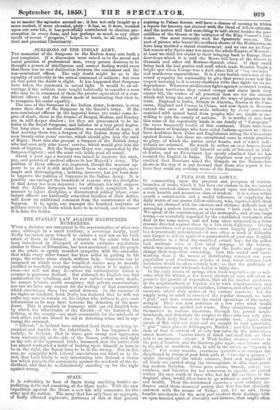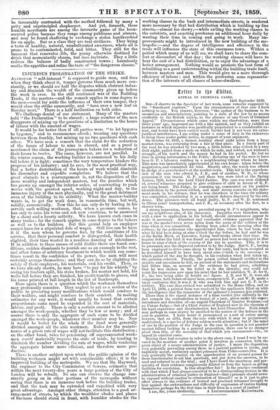A PLEA FOR THE LOWLY.
Iar commenting upon the progress and prospects of various branches of trade, which it has been our custom to do, we cannot entirely overlook claims which are forced upon our attention.by a very humble and numerous class of traders. It is a class which • exerts a considerable and a useful influence, in supplying the daily wants of our poorer fellow-citizens, who, together with their wives, are charged with the onerous and ofttimes difficult task of managing a narrow income, so as to cause " both ends to meet." We speak of the costermongers of the metropolis, and of our large towns,—so scornfully regarded by the established tradesmen who deal in the same wares, and not long since subjected to a tierce crusade directed against them by a late civic dignitary. During those troublous and persecuting times—now happily passed over but deprecatorily remembered—it was often a work of difficulty and danger to sell an apple or a pennyworth of good ripe English gooseberries to a tired dry-mouthed errand boy ; for the police took umbrage even at that brief stoppage of the barrow, which was necessary in order to allow the fruits and copper to change their respective ownership. Now this useful and hard- working class is the means of distributing amongst our poor population good wholesome articles of food, which without such assistance would be often entirely lost ; so that the gratitude of both consumer and wholesale dealer is fairly due.
In the early season of spring, when fresh vegetables are so wel- come after the winter, a few heavy showers of rain will often so promote the growth of vegetation, that all the market gardeners in the neighbourhood of London set to work simultaneously and draw immense quantities of radishes, lettuces, and other agreeable esculents which duly arrive at the various markets ; but the supply being so much in excess of the regular demand, we have " glut," and here commence the useful operations of the water- monger. They can now purchase at a low price what would otherwise become spoiled and waste. They straightway scatter themselves in various directions through the poorer neigh- bourhoods, and distribute the surplus to those who can only pur- chase their daily food at the lowest possible cost. Again, when shoals of fish visit our coast and are caught in vast quantities, " glut " takes place in Billingsgate Market ; and this important item of food is carried off at very low rates by the industrious street hawkers. Various kinds of dried and shell fish are thus sold to an immense extent. A West Indian steamer arrives in the port of London, and the luscious pine apple, once known only to the rich or would-be rich, is sold in the streets at " a penny a slice." For many months, enormous quantities of oranges are distributed by troops of poor Irish girls at " two for a pinney ; " whilst throughout the whole summer, fruit and vegetables of all kinds are carried along the thoroughfare in this ever-grow- ing modern Babylon. Green peas, onions, brocoli, celery, cu- cumbers, and luxuries far too numerous to specify, are placed within the easy reach of those who, but for the exertions of the despised class, would often have to go without so much pleasure and health. Thus the contemned exercise a most salutary, in- fluence amid those classes of society that Fate has but slenderly endowed with the means of living; and, let us add, these humble merchants for the most part conduct their dealings with an open-handed spirit of liberality and fairness, that might often be favourably contrasted with the method followed by many a petty and unprincipled shopkeeper. And yet, forsooth, these humble merchants are among the favourite game of the keen- scented police because they range among publicans and sinners, and may be found chaffering to exchange a stolen handkerchief for an apple. But as a class they are real civilizers. They bring a taste of healthy, natural, unadulterated sweetness, where all is prone to be contaminated, fetid, and bitter. They still for the innocent that renovates ;life, the penny otherwise destined for drink that momentarily cheers, but does inebriate. They a little redress the balance of badly constructed towns ; harmlessly soothe the appetites and refine the taste of "the dangerous classes."



























 Previous page
Previous page